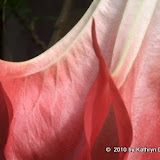Salmon r Us
 It's like a penance, it occurs to me, these men dumping out crate upon crate of salmon carcass into the Columbia River of the Pacific Northwest, a move toward restoring it to health. I see a prayer in their actions too: Please, River, forgive us. Please, salmon, forgive us. I have happened upon a Nature program telling some of the story of what has happened to the Pacific wild salmon and the Columbia River basin over the last 150 years. I learn that human intrusion has upset the natural balance of that region to the extent that 13 species of salmon--the prized sockeye among them--are endangered, and several others are already extinct.
It's like a penance, it occurs to me, these men dumping out crate upon crate of salmon carcass into the Columbia River of the Pacific Northwest, a move toward restoring it to health. I see a prayer in their actions too: Please, River, forgive us. Please, salmon, forgive us. I have happened upon a Nature program telling some of the story of what has happened to the Pacific wild salmon and the Columbia River basin over the last 150 years. I learn that human intrusion has upset the natural balance of that region to the extent that 13 species of salmon--the prized sockeye among them--are endangered, and several others are already extinct.We've done it again. Dams, hatcheries: we thought them good ideas when we built them. But the harm they've caused and the subsequent attempts to reverse it have cost a lot and yielded very little. Hatcheries were designed to solve the problem of collapsing salmon populations caused by the interference of the dams, but they introduced their own problems, a dying river among them.
 cell of the body of that system, and the otherwise unbroken wheel of the life cycle is breached. With the circle broken, the life cannot cycle; it must dead end. When we stomp out "pests" or parasites or predators in large numbers (or relocate them), for example, a brilliant balance is tipped, and an exquisite "machine" if you will grinds to a halt.
cell of the body of that system, and the otherwise unbroken wheel of the life cycle is breached. With the circle broken, the life cannot cycle; it must dead end. When we stomp out "pests" or parasites or predators in large numbers (or relocate them), for example, a brilliant balance is tipped, and an exquisite "machine" if you will grinds to a halt.I watched Idaho Fish and Game men in trucks taking extraordinary measures to help
 recover the salmon populations and the Basin, and it did my heart good. Just as it did my heart good to learn that in Australia, "dedicated under-
recover the salmon populations and the Basin, and it did my heart good. Just as it did my heart good to learn that in Australia, "dedicated under-passes" have been built for--and are being used by!-- koalas and other wildlife whose habitats have been split apart by urban development and its resulting highways. That human beings are putting their minds and funds and energy to protecting these endangered cells of our One Body is a good sign to me.



0 Comments:
Post a Comment
<< Home